
-
 Mexican president hopes to talk with Trump to avoid tariffs
Mexican president hopes to talk with Trump to avoid tariffs
-
The risks of Trump tariffs encapsulated in a car key

-
 Trump says China to face added 10% tariff starting in March
Trump says China to face added 10% tariff starting in March
-
Toronto Pride says sponsors bolting over Trump's anti-DEI push

-
 In major shift, Ocalan calls for PKK to drop weapons, disband
In major shift, Ocalan calls for PKK to drop weapons, disband
-
Baby, you're a firework! Katy Perry to blast off into space

-
 European stock markets slide as Trump targets EU with tariffs
European stock markets slide as Trump targets EU with tariffs
-
Ocalan: Kurdish PKK founder who urged his fighters to disarm

-
 'No need to overthink': China Tesla fans unfazed by Musk politics
'No need to overthink': China Tesla fans unfazed by Musk politics
-
Audi Brussels shuts down as Europe's auto woes deepen

-
 Stock markets struggle as Trump tariffs target EU
Stock markets struggle as Trump tariffs target EU
-
Jailed PKK leader Ocalan expected to call for peace with Turkey

-
 EU's top team in India to bolster relations
EU's top team in India to bolster relations
-
Two men publicly flogged in Indonesia for gay sex

-
 Thank you! Oscars speeches over the years
Thank you! Oscars speeches over the years
-
The women brewing change in India, one beer at a time

-
 Asian markets mixed after latest Trump tariff threat
Asian markets mixed after latest Trump tariff threat
-
7-Eleven owner shares plunge as family buyout fails

-
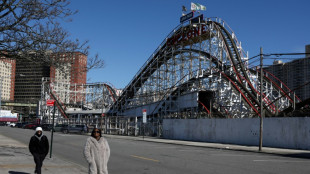 Oscar fave 'Anora,' a 'love letter' to eccentric beachside Brooklyn
Oscar fave 'Anora,' a 'love letter' to eccentric beachside Brooklyn
-
Hamas hands over bodies of Israelis as more Palestinian prisoners freed
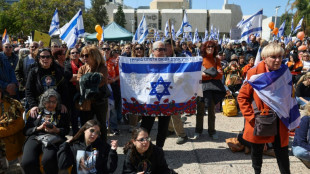
-
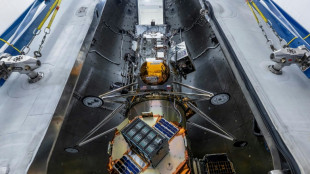 Private US company blasts off for second Moon landing attempt
Private US company blasts off for second Moon landing attempt
-
US Fed will 'adapt' to any policy changes, Chicago's Goolsbee says

-
 AI chip giant Nvidia reports blockbuster revenue
AI chip giant Nvidia reports blockbuster revenue
-
EU was born to 'screw' US, Trump says

-
 Trump's trade envoy Jamieson Greer confirmed by lawmakers
Trump's trade envoy Jamieson Greer confirmed by lawmakers
-
Eyeing Trump trade policy shakeup, Eli Lilly to build 4 US factories

-
 Amazon's next-gen Alexa gets AI upgrade
Amazon's next-gen Alexa gets AI upgrade
-
G20 leaders say global stability threatened by declining cooperation

-
 US new home sales miss expectations in January on cold weather
US new home sales miss expectations in January on cold weather
-
EU vows to slash red tape but stick to climate goals

-
 France court orders retrial of Chilean over alleged murder of ex-girlfriend
France court orders retrial of Chilean over alleged murder of ex-girlfriend
-
Dreadlocks and downward dogs: Oslo's new bishop takes unorthodox approach

-
 Indonesia agrees deal with Apple that could end iPhone sales ban
Indonesia agrees deal with Apple that could end iPhone sales ban
-
Global stability threatened by backslide in cooperation: S.Africa

-
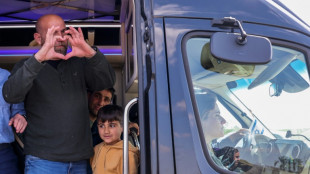 'Sorry I couldn't protect you': Israel mourns Bibas mother, sons
'Sorry I couldn't protect you': Israel mourns Bibas mother, sons
-
BP ditches climate targets in pivot back to oil and gas

-
 EU seeks to balance business needs, climate goals
EU seeks to balance business needs, climate goals
-
Stock markets rally with tech in focus

-
 BP to up oil and gas output, slash clean energy spend in overhaul
BP to up oil and gas output, slash clean energy spend in overhaul
-
Los Angeles wildfires costliest in history: Munich Re

-
 'Brat' icon Charli XCX picks up Brit award for best songwriter
'Brat' icon Charli XCX picks up Brit award for best songwriter
-
AB InBev posts record sales in 2024 despite beer volumes slipping

-
 Aston Martin cuts jobs as weak China demand weighs
Aston Martin cuts jobs as weak China demand weighs
-
Stellantis says 2024 profits fall 70% on N. America troubles

-
 'Joyful' South Koreans hope rising births will continue
'Joyful' South Koreans hope rising births will continue
-
Indonesia agrees deal with Apple that could end iPhone sales ban: reports

-
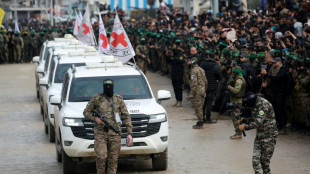 US says Gaza ceasefire talks on track
US says Gaza ceasefire talks on track
-
Tech surge helps Hong Kong lead most Asian markets higher

-
 Hong Kong to slash public spending, build AI institute
Hong Kong to slash public spending, build AI institute
-
Israelis mass for funeral of Bibas hostages killed in Gaza
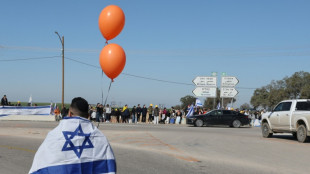

Ocalan: Kurdish PKK founder who urged his fighters to disarm
Abdullah Ocalan, the jailed founder of the militant Kurdistan Workers Party (PKK), is an icon to many Kurds, but a "terrorist" to many within wider Turkish society.
In a historic call on Thursday, Ocalan called for his PKK to be dissolved and its fighters to lay down their arms in a major step towards ending the decades-long conflict with the Turkish state.
Now 75, Ocalan has been held in solitary confinement since 1999 on Imrali prison island near Istanbul.
But since October, when Turkey tentatively moved to reset ties with the PKK, Ocalan has been visited three times by lawmakers from the pro-Kurdish opposition DEM party.
For most Turks, Ocalan is public enemy number one for his role in leading the PKK.
In 1978, he founded the group which six years later began an insurgency demanding independence and, more recently, broader autonomy in Turkey's mostly Kurdish southeast. Tens of thousands of people have died.
A Marxist-inspired group, it is blacklisted as a "terrorist" organisation by Turkey, the United States, the European Union and many other Western countries.
- An olive branch -
Attitudes began shifting in October when MHP leader Devlet Bahceli, a close ally of President Recep Tayyip Erdogan, offered Ocalan an olive branch if he would publicly renounce terror.
The next day, the former guerrilla who embodies the decades-long Kurdish rebellion, received his first family visit in four years.
He sent back a message saying he alone could shift the Kurdish question "from an arena of conflict and violence to one of law and politics" later offering assurances he was "ready to take the necessary steps and make the call".
Ankara's bid to reopen dialogue came just weeks before Syrian rebels overthrew Bashar al-Assad, upending the regional balance of power and once again thrusting Turkey's complex relationship with the Kurds into the spotlight.
- From village life to militancy -
Ocalan was born on April 4, 1949, one of six siblings in a mixed Turkish-Kurdish peasant family in Omerli, a village in Turkey's southeast.
His mother tongue is Turkish.
He became a left-wing activist while studying politics at university in Ankara, and was first jailed in 1972.
He set up the PKK six years later, then spent years on the run, launching the movement's armed struggle in 1984.
Taking refuge in Syria, he led the fight from there, causing friction between Damascus and Ankara.
Forced out in 1998, he moved from Russia to Italy to Greece in search of a haven, ending up at the Greek consulate in Kenya, where US agents got wind of his presence and tipped off Turkey.
He was arrested on February 15, 1999 after being lured into a vehicle in a Hollywood-style operation by Turkish security forces.
Sentenced to death, he escaped the gallows when Turkey started abolishing capital punishment in 2002, living out the rest of his days in isolation on Imrali prison island in the Sea of Marmara near Istanbul.
For many Kurds, he is a hero whom they refer to as "Apo" (uncle). But Turks often call him "bebek katili" (baby killer) for his ruthless tactics, including the bombing of civilian targets.
- Jailed but still leading -
With Ocalan's arrest, Ankara thought it had decapitated the PKK. But even from his cell he continued to lead, ordering a ceasefire that lasted from 1999 until 2004.
In 2005, he ordered followers to renounce the idea of an independent Kurdish state and campaign for autonomy in their respective countries.
Tentative moves to resolve Turkey's "Kurdish problem" began in 2008, and several years later, Ocalan became involved in the first unofficial peace talks when Erdogan was prime minister.
Led by then spy chief Hakan Fidan -- who is now foreign minister -- the talks raised Kurdish hopes for a solution with their future within Turkey's borders.
But the effort collapsed in July 2015, sparking one of the deadliest chapters in the conflict.
The government has defended its de facto silencing of Ocalan, saying he failed to convince the PKK of the need for peace.
Seen as the world's largest stateless people, Kurds were left without a country when the Ottoman Empire collapsed after World War I.
Although most live in Turkey, where they make up around a fifth of the population, the Kurds are also spread across Syria, Iraq and Iran.
Turkey's wide-scale use of combat drones has pushed most Kurdish fighters into northern Syria and Iraq, where Ankara has continued its raids.
A.Leibowitz--CPN
